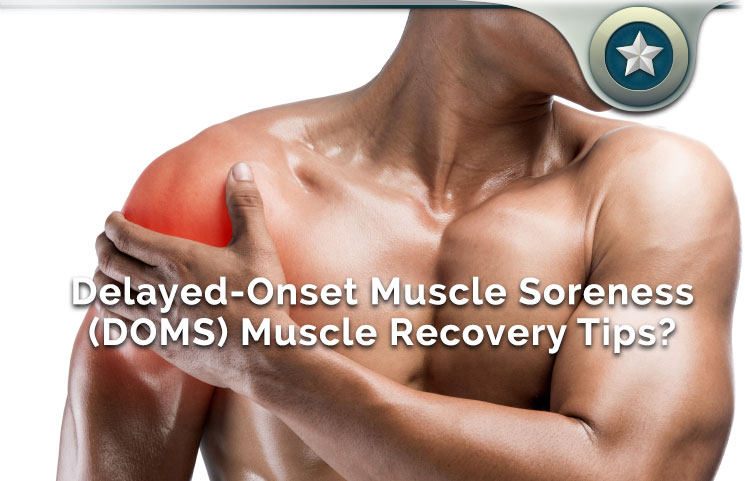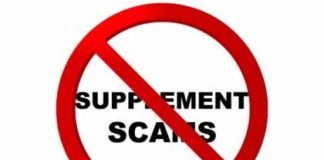It’s normal to ache all over and feel sore shortly after an intense or new workout session. But, when you wake up a day or two after feeling like someone took a tire iron to your body while you were asleep, then you have what is known as DOMS –short for delayed onset muscle soreness.
This condition is one that occasionally plagues all serious weightlifters, bodybuilders and fitness buffs. In the past, possible solutions included going in for a few massage sessions, popping some pain meds and hoping the pain goes away or just waiting it out.
Unfortunately, it can be a bit of a drawback when you have muscle growing goals and don’t want to miss a day in the gym. Now, the good news is that it’s possible to prevent it from happening.
So, if you know that you’ll be starting a new type of workout regimen that’s completely different from what you’re used to, you can simply take a few supplements for sore muscles that will accelerate your healing and you’ll be fine, even after a particularly punishing workout.
Delayed onset muscle soreness happens to just about anyone looking to increase their bulk, become stronger or leaner. This typically means increased training intensity and/or a completely new exercise regimen.
How Can You Differentiate Delayed-Onset Muscle Soreness (DOMS) From Regular Post-Workout Pains?
Simple. With DOMS you get to experience the following:
- Unusual muscle tightness
- Short-term muscular weakness –you don’t feel as strong as you normally do
- Possible limited range of motion
- Accompanying stiffness in the joints closest to the muscle groups
- Widespread ache that slowly creeps up on you and takes forever to go away
- General weakness arising from the ache
If you have this, you will know. It’s not easy to ignore or mistake for any other kind of pain. Once the wave hits you, you know it. It’s that simple.
While we know what causes DOMS, scientists haven’t determined why it happens, which means we’ll have to keep enduring it until scientists can prove why. What we do know right now is that it is linked to specific exercises:
- Eccentric exercises –exercise that create tension while the muscle group grows and becomes longer
- Concentric exercises –exercises that help contract the muscle
- Isometric exercises –exercises that work on muscle groups but don’t affect their length or size
While these three tend to trigger it, the most commonly responsible exercise that does this is the eccentric.
So, if you do lift more weights than you normally do, increase your reps and sets, start jogging, do more high intensity interval training (HIIT), do a lot more jumping exercises, run a lot more and participate in aerobic exercises, you will most likely experience an episode of DOMS.
This makes sense seeing as your muscles are growing and you’re probably doing a lot more than the regular workouts to get the results you need. Putting your muscles through a new regimen is bound to result in your muscles breaking down in new ways.
These muscle breakdowns often show up as microscopic tears that may trigger some inflammation. This inflammation, as well as other bodily processes that eventually result in your muscles healing is probably the reason you experience DOMS.
Who is More at Risk of Developing DOMS?
People and athletes who undergo a new type of workout or do way more than they are used to in the gym will most likely have an episode of DOMS.
However, those who lack the necessary strength conditioning –which happens by consistent strength training by the way- will always experience it a lot more and will be more susceptible to it.
Also, training intensely for prolonged periods without any rest or workouts that will improve your flexibility will leave you open and vulnerable to DOMS too.
Please understand that no matter how fit or how much experience you have at working out, you can suffer from DOMS by simply overtraining and not being careful about your regimens, and lifestyle after your workouts.
Bottom line, no matter how fit you are, expect to go through a phase of DOMS every time you switch things up, push yourself way past your former limits, increase your workout intensity, take on more difficult or challenging workouts and aim for growth and attaining a higher level of fitness. The same applies to everyone, whether you’re a fitness enthusiast or a couch potato.
Delayed-Onset Muscle Soreness Recovery – How Long Does it Take?
Honestly, this depends on a multitude of factors, some of which include:
- Ability to rest
- Taking DOMS recovery supplements
- Access to pain relief meds
- Alternative pain relief methods such as massage, and acupuncture
- Applying pain relief ointments, gels and creams
- Diet and food
- Tendency to workout or not
Most of the time, simply resting and taking a break from your workouts is more than enough. The thing though, is this approach takes time –as long as 3-5 days depending on the severity. However, combine this with muscle recovery supplements and you should be able to get back to the gym and your workouts within 1-2 days.
While you may want to get back in the gym as quickly as possible, please understand that DOMS is your body’s way of telling you take a break and wait out the muscle repair process. If you want to continue working out while in pains –essentially “playing through the pain”- consider the intensity of the pain. With mild DOMS, workouts may be possible.
With moderate to severe, you may find yourself inn more pains than you should feel during your workouts. The onus, ultimately lies on you, really.
How Can You Avoid a Repeat DOMS Episode?
For starters, grow in increments. That means, if your goal is to be able to bench 300lbs, and your max weight is currently at 180lbs, increase the weight by 20lbs every 3-5 days.
If you want to be able to jog at a moderate to fast pace for 30 minutes straight, start by peppering your current jogs with 2-3 minutes of moderate pace jogging for every 15 minutes of your regular pace.
Gradual is key and necessary if you want to only suffer a mild DOMS episode at best.
Best Muscle Recovery Supplements
If you want to accelerate your recovery, you need to try the best supplements for muscle soreness. The good news is that these are readily available in the market, and affordable too. Some of the best muscle recovery supplements include a stack of two or more of the following:
- Branched chain amino acids (BCAA)
- Beta-hydroxy-beta-methylbutyrate (HMB)
- L-Carnitine
- L-Citrulline
- L-Arginine
- Pomegranate
- Omega 3,6,9
All of these combined can help rapidly relieve instances of DOMS, resulting in faster recovery time.









